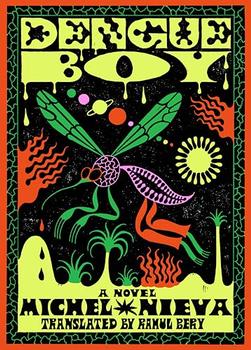
For fans of David Cronenberg's films and lovers of Kafka, this gaucho-punk, sci-fi novel set in 2197 offers an explosive interpretation of an ultra-capitalistic society on the brink of climate collapse.
The protagonist of this story has no understanding of the words "winter," "cold," or "snow" because he has never experienced the phenomena they describe. We find ourselves in Victorica, a province of La Pampa, Argentina, sometime after 2197 – the year in which the last of the Antarctic icecaps melted and an unprecedented climate catastrophe ensued, radically transforming the landscape of the region into a Caribbean Pampas. It is here that the Dengue Child grows up, a mutant mix of child and mosquito, the result of crazy experimenting driven by ultra-capitalistic corporations racing against each other to own viruses and their cures, destroying even their very own children's existence to cash in on the stock exchange.
Another of the surprising effects of the thaw is the appearance of powerful telepathic pebbles from the bowels of the earth that seem to encapsulate the world's original wisdom, and which are the subject of lucrative smuggling. Meanwhile, the wealthy of the region chose to cruise around on ships where they can experience ice-skating and hand carve ice from valuable remains of glaciers. In their ultra-air conditioned homes, their kids play Indians vs Christians, a brutal video game set in the historical 19th century.
The future according to Michel Nieva looks frenetic and shocking. His is one of the most exciting literary voices emerging from Argentina, packing punches in a deeply intelligent, informed, and humorful prose which takes root in Latin American storytelling and sci-fi tradition.
"Delightfully gonzo and hilariously surreal, this novel turns nightmarish visions into vital art. It's a sui generis showstopper." —Publishers Weekly (starred review)
"A dystopian fever dream that's equal parts poetic and profane, beautiful and splattered with gore." —Booklist (starred review)
"Michel Nieva has placed a strong bet with this steampunk novel that imagines the disappearance of the south of Latin America between gaucho literature, violent videogames and monetized diseases. Intelligent, entertaining and brutal." —Mariana Enriquez, author of A Sunny Place for Shady People
"An incandescent imagination that illuminates the strangeness of everything around us with just the right amounts of unease and tenderness." —Valeria Luiselli, author of Lost Children Archive
This information about Dengue Boy was first featured
in "The BookBrowse Review" - BookBrowse's membership magazine, and in our weekly "Publishing This Week" newsletter. Publication information is for the USA, and (unless stated otherwise) represents the first print edition. The reviews are necessarily limited to those that were available to us ahead of publication. If you are the publisher or author and feel that they do not properly reflect the range of media opinion now available, send us a message with the mainstream reviews that you would like to see added.
Any "Author Information" displayed below reflects the author's biography at the time this particular book was published.
Michel Nieva was born in 1988 in Buenos Aires, Argentina. In his native Spanish he has published several novels, poetry collections and essays. His prose mixes science fiction and speculative genres with Argentinean historical and literary traditions, a blend dubbed gaucho-punk. In 2021 Nieva was named among the best young Spanish writers by Granta magazine. His short story Dengue Boy (basis for the novel with the same title), won the O. Henry Award in 2022. Michel lives in New York and teaches Latin American literature at NYU.
Give me the luxuries of life and I will willingly do without the necessities.
Click Here to find out who said this, as well as discovering other famous literary quotes!
Your guide toexceptional books
BookBrowse seeks out and recommends the best in contemporary fiction and nonfiction—books that not only engage and entertain but also deepen our understanding of ourselves and the world around us.